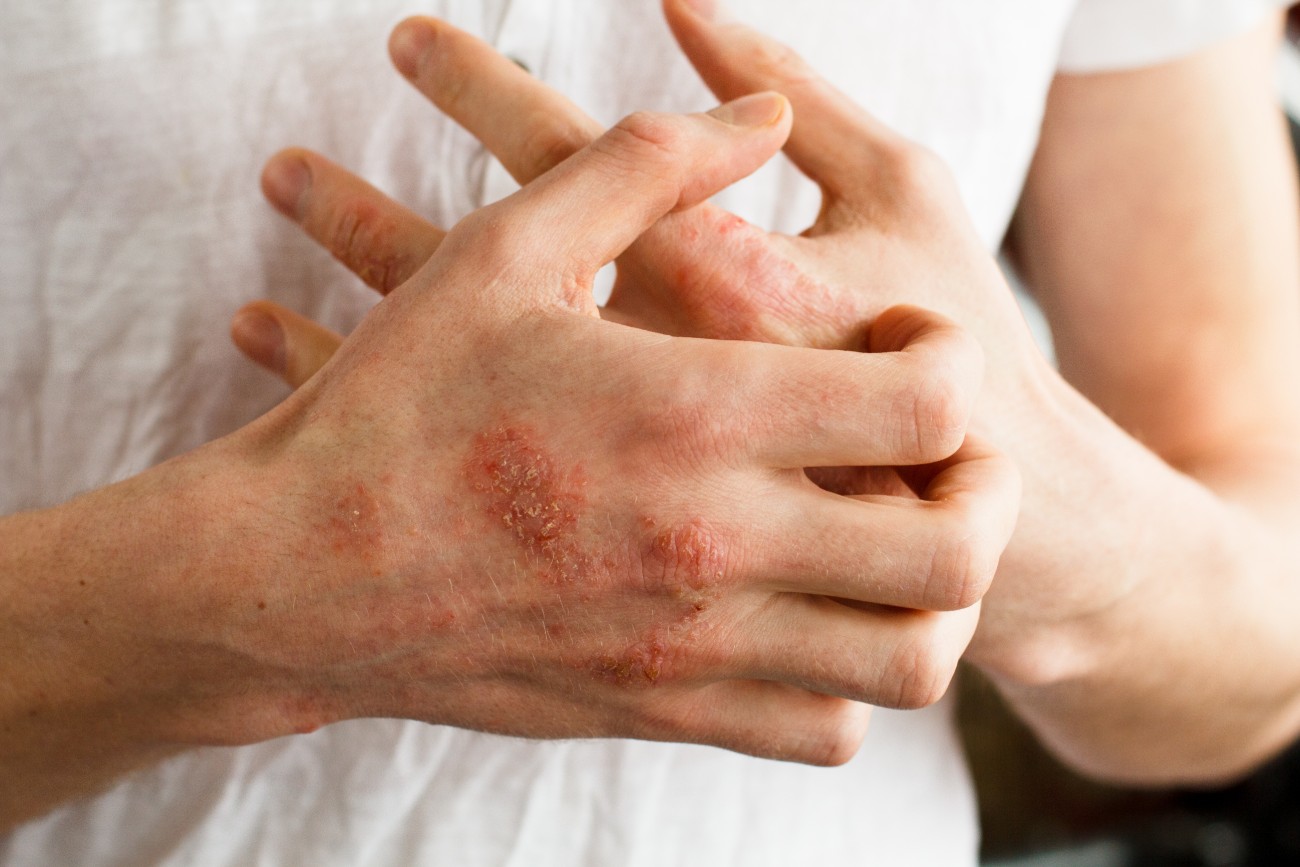One of the most prevalent skin conditions people is eczema. In the U.S. alone, eczema affects an estimated 31.6 million people.1 It’s also the most common skin condition for children, with over 10 percent of children being diagnosed in their first 10 years of life.2 There isn’t a cure for eczema, so it’s important for people to learn how to manage the condition and minimize their chance of an outbreak.
The first step to treating eczema is recognizing the symptoms. The good news is eczema can be a bearable condition to live with. But if left untreated, you can experience severe discomfort and skin issues.
 Ternavskaia Olga Alibec / Shutterstock
Ternavskaia Olga Alibec / ShutterstockSymptoms and Signs of Eczema
Eczema can appear at any age. It’s a lifelong condition that can flare up periodically, and the severity of symptoms can vary from person to person. The longer you go without treatment, the worse your eczema flare up can be.
Common symptoms3 for eczema include:
- Dry skin
- Scaly, itching patches
- Red to brownish-gray patches
- Small, raised bumps which may leak fluid and crust over when scratched
- Thickened, cracked, scaly skins
- Raw and sensitive skin from scratching
The most common areas of the body4 where these symptoms might appear are:
- Hands and feet
- Inside of your elbows
- Backs of your needs,
- Face, cheeks
- Behind the ears
- Buttocks
Eczema can appear on more than one part of the body. It’s important that when these symptoms appear, you don’t scratch. This can irritate the skin more and lead to more serious side effects.
You should see a doctor if these symptoms prevent you from living or sleeping comfortably. If it doesn’t go away using home remedies or leads to a skin infection, then it’s time to visit your doctor and learn how to medically treat it.
Risk Factors
There is no definitive cause for eczema and it isn’t contagious, though it’s possibly linked to an overactive response5 by the body’s immune system to irritants. That’s why being exposed to certain environmental factors could lead to an outbreak.
About 70 percent of eczema cases start in children younger than five years old.6 Some might grow out of this condition, but about 60 percent of infants with eczema will continue to have symptoms in adulthood.7
A number of things can trigger a flare up. Some of these include:
- Irritants from soaps, detergents, shampoos, etc.
- Allergens such as dust mites, pets, pollen, mold, dandruff, etc.
- Hot and cold temperatures and/or water
- Certain foods such as dairy products, eggs, nuts and seeds, soy, wheat
- Stress
- Hormones
If you think you have eczema, be mindful of how your body reacts to any of these potential triggers. This will help you learn what to avoid and understand prevent a flare up. It is possible to experience symptoms despite avoiding triggers, making medical treatments your best chance at soothing your skin.
Treatments for Eczema
Eczema might be moderate enough to go away on its own by regularly moisturizing your skin. For people with more severe cases, seeking advice from a doctor might be the only way to manage flare ups.
It isn’t difficult to diagnose, though a doctor might review your family history and use patch tests to rule out other diseases.There are a few things they might prescribe you to treat your condition.
Doctors will typically prescribe you a corticosteroid cream or ointment to apply directly on the skin. You can moisturize with a gentle cream or vaseline before applying it as a soothing barrier since certain doses might be strong. Oral medications also exist for temporary use in patients with severe conditions.
Those over the age of 12 with moderate to severe eczema might want to try Dupixent. It’s a relatively new alternative to topical therapy that works by targeting the underlying inflammation eczema causes with an injection.8
There are also non-prescription remedies you can use at home to treat eczema outbreaks. Some of them include:
- Using a gentle moisturizer twice a day
- Anti-itch cream (ex. One percent hydrocortisone non-prescription)
- Allergy medication
- Using a humidifier
- Wearing loose clothing
Using a combination of these remedies in addition to prescription medication can help your condition. These are also good preventive things you can do to prevent a flare up from occurring.
Living With Eczema
Millions of people are living with eczema. It can be an itchy and painful experience, but there are treatments that can keep your skin healthy and prevent outbreaks for longer periods of time. It starts with understanding your condition and recognizing the symptoms.
Do your best to avoid irritants that lead to flare ups. Regularly keep your body moisturized with creams at least twice a day, take shorter baths or showers, and use gentle everyday products on the skin. Dry pat your body with a towel to avoid irritating your skin and drying it out.
Before trying new medications or treatments, make sure to get your doctor’s approval. It’s always possible to experience side effects, so learning about it from a medical professional can help you be prepared.


